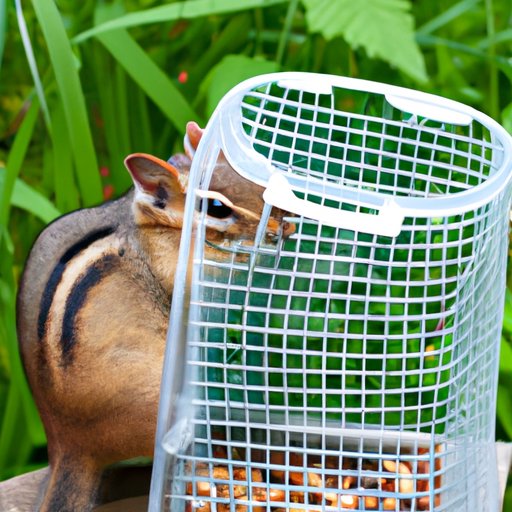
Introduction
Chipmunks are cute and adorable creatures; however, they can become quite the nuisance when they begin to invade your garden or yard. They nibble on bulbs, flowers, and fruits, and their burrowing habits can destroy the root systems of plants. So, it’s essential to get rid of chipmunks once you notice them. This article will provide an overview of various methods to get rid of chipmunks, including natural, chemical, and professional pest control.
Natural methods for repelling chipmunks
One of the effective ways to get rid of chipmunks is through natural methods. Here are some natural methods for repelling chipmunks:
Identify natural repellents
Certain plants and essential oils are unpleasant to chipmunks and can be used as natural repellents. Some examples of plants that repel chipmunks include garlic, daffodils, and marigolds. Likewise, essential oils like peppermint oil, cinnamon oil, and eucalyptus oil can deter chipmunks from entering your garden.
Tips on how to use these methods effectively
To use plants and essential oils as natural repellents, place them around the perimeter of your garden or yard. Plant the known chipmunk-repelling plants around the garden. For essential oils, soak cotton balls with a few drops of the essential oil, and place them in strategic locations throughout the garden.
Discussion on creating barriers to prevent chipmunks from entering your property
Another natural method for keeping chipmunks away from your yard or garden is by creating barriers. Installing a physical barrier like chicken wire around the garden will prevent chipmunks from burrowing beneath it to enter your garden.
Live trapping
Live trapping is a humane method of eliminating chipmunks. Here are some tips to trap chipmunks safely:
Step-by-step guide on how to set a live trap for chipmunks
To capture the chipmunks with a live trap, place the trap in the burrowing area or near the plants they frequent. Be sure to read the instructions before setting up the trap.
Recommended bait to use when trapping chipmunks
To lure the chipmunks into the trap, use bait like peanut butter or sunflower seeds. Place a tablespoon of the bait in the center of the trap.
Best locations for placing the trap
The best places to set up a trap are burrowing areas or the plants they frequent.
Chemical repellents
There are different types of chemical repellents available in the market that can help in getting rid of chipmunks. Here are some options:
Overview of the effectiveness of chemical repellents in getting rid of chipmunks
The effectiveness of chemical repellents depends on the type of repellent and the extent of the chipmunk infestation. Their effectiveness can range from moderate to high.
Discussion of different types of chemical repellents and their application methods
There are two types of chemical repellents: taste-based repellents and scent-based repellents. Taste-based repellents like Critter Ridder use capsaicin or hot pepper extract to create an unpleasant taste. Scent-based repellents like Shake-Away work by mimicking the urine of natural predators like foxes and coyotes to scare chipmunks away. To apply chemical repellents, follow the manufacturer’s instructions closely.
Safety precautions and proper handling techniques
While using chemical repellents, ensure that children and pets are kept away from the treated area. Wear gloves and avoid inhaling the chemicals while handling. Store the repellents in a safe place out of reach of children and pets.
Predator deterrents
Another way to curb chipmunk populations is by attracting natural predators. Here are some natural predators that can keep chipmunks at bay:
Identification of natural predators that can curb chipmunk populations
Predators like cats, dogs, and birds of prey like hawks and owls can help in reducing chipmunk populations.
Explanation of how to attract predators to your property
Attracting natural predators such as cats, dogs, and birds of prey to your property can happen by providing food and water. Be sure to follow local ordinances and regulations when feeding animals.
Habitat modification
Modifying the chipmunks’ environment is another way of reducing their presence in your garden. Here are some tips to modify their habitat:
Detailed discussion of how to modify the chipmunks’ environment to reduce their presence in your garden
One of the ways to modify their environment is to remove the debris and cover they use for hiding. Clearing away dead leaves, rocks, and other debris that provide cover can make your garden less appealing to chipmunks. Another habitat modification strategy is blocking their burrowing areas by filling them with gravel or soil.
Professional pest control services
If the above methods are ineffective, it may be time to call in professionals to handle the chipmunk infestation. Here are some considerations:
Overview of when to seek professional help in eliminating chipmunks
If the problem persists after trying different control methods, it may be time to contact a pest control service.
Discussion of the different types of pest control treatment available
Professional pest control services offer different types of pest control treatments that include trapping, chemical sprays, and fumigation.
Potential costs and expectations for hiring a professional pest control service
The cost of professional pest control services varies depending on the extent of the infestation and the treatment method used. It is best to ask for a free quote and an estimated timeline from the chosen pest control service.
Conclusion
Getting rid of chipmunks is necessary to protect your garden from destruction and save your plants from constant nibbling. Natural methods like creating barriers, live trapping, chemical repellents, predator deterrent, and habitat modification can help control chipmunk populations. If these methods fail, calling in professionals is the next step to take. It is essential to choose the right control method based on your specific needs and situation for long-term results.




